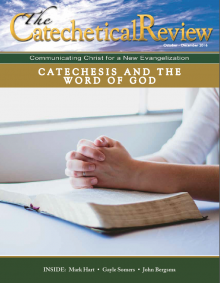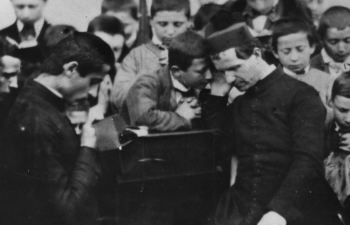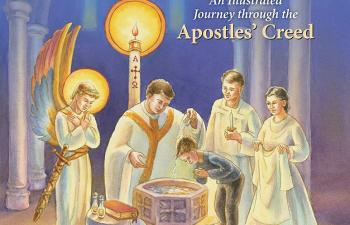Earlier this year, Pope Francis promulgated The Joy of Love as a major part of the Church’s commitment to proclaim the Gospel of the Family  in response to “the many signs of crisis in the institution of marriage” (no. 1). The rather lengthy document reiterates and consolidates much of the work of the recent synod on marriage and family, while also offering the Pope’s own profound reflections concerning the nature of marital love, the dynamics of family life, the education of children, and family spirituality.
in response to “the many signs of crisis in the institution of marriage” (no. 1). The rather lengthy document reiterates and consolidates much of the work of the recent synod on marriage and family, while also offering the Pope’s own profound reflections concerning the nature of marital love, the dynamics of family life, the education of children, and family spirituality.
By virtue of its sheer length and breadth of content, the document requires considerable time and effort to work through, and reaping the full fruits of Pope Francis’ teachings will certainly be a long term and multi-faceted process. Nonetheless, for those of us working in educational and pastoral situations there are key parts of the text that immediately stand out for the fundamental shape that they give to all our attempts to help others understand and more fully embrace God’s plan for sex, love, and marriage.
In addition to the clear emphasis he places on the need both for “a unity of teaching and practice in the Church” and for efforts to seek “solutions best suited to specific cultures and local needs” (3), Pope Francis sets forth some basic guidelines for our work in the Church with his teachings on the challenges of families and on accompanying those in irregular situations.
Recognizing the Challenges We Face
In chapter three of The Joy of Love, Pope Francis encourages those of us working in the Church to present a positive and attractive theology of marriage, resisting the temptation to stop advocating marriage “simply to avoid countering contemporary sensibilities, or out of a desire to be fashionable or a sense of helplessness in the face of human and moral failings” (35). However, he also indicates that we need to be realistic in recognizing the obstacles that prevent many from understanding or fully embracing God’s plan for human sexuality and human love, anticipating the trends that will be working against our efforts at evangelization and pastoral care.
Pope Francis calls for “a healthy dose of self-criticism” on the part of those working within the Church so that we can avoid approaches that are “far too abstract” (36), are merely “defensive” (38), present marriage as a “burden” (37), or “fail to inspire confidence” in God’s transforming grace (36, 37). Instead, we must commit ourselves to making “a generous effort to present the reasons and motivations for choosing marriage” (35), to finding “the right language to appeal to people’s capacity for generosity, commitment, love, and even heroism” (40), and to helping people respond to God’s grace so that they can “take up the challenge of marriage with enthusiasm and courage” (35, 40).
At the same time, we need to admit that even our best efforts to proclaim the Gospel will fall short if we do not also address the obstacles, which hold many people back from fully responding to God’s plan for sex, love, and marriage. These obstacles correspond to the root causes of the crisis regarding the devaluing of marriage in the modern world; and unless we help people to recognize and resist the trends that currently devalue marriage, we can hardly expect to succeed in making marriage attractive and meaningful in the way that Pope Francis advocates.
Among these problematic trends, we should focus on three fundamental issues identified by Pope Francis in this part of the text: extreme individualism, relativism, and affective immaturity.
Extreme individualism weakens family bonds and treats each member of the family as an isolated unit, leading in some cases to “the idea that one’s personality is shaped by his or her desires, which are considered absolute” (33).
Relativism replaces the genuine notion of freedom with “the idea that each individual can act arbitrarily, as if there were no truths, values, and principles to provide guidance, and everything were possible and permissible (34).
Affective immaturity makes people “incapable of looking beyond themselves, beyond their own desires and needs,” which in turn subjects personal relationships to the consumer and makes everyone and every relationship “disposable” (39).
This simple sketch of these trends makes it fairly clear that the obstacles people face in living the Gospel of the Family would be basic obstacles to living the Gospel in general. Pope Francis’ underlying message, then, is that we cannot expect people to start living their sex lives the way God wants them to until they start living their whole lives the way God wants them to. In other words, it would be naïve to think that we just need a better way of explaining our teachings on human sexuality without actually facing the deeper challenges to Christian discipleship in the modern world.
Accompanying Those in Irregular Situations
Invariably our work will bring us into contact with those who manifest “frailty” and “signs of a wounded and troubled love” that hinders them from living out God’s will for their lives (291); and in chapter eight of The Joy of Love, Pope Francis describes some basic elements of the attitude we need in order to be a “beacon” of hope and confidence to “those who have lost their way” (291).
The various difficult situations that we may encounter include cases such as cohabitation, merely civil unions, spousal abandonment, divorce and remarriage, and homosexual unions. Pope Francis acknowledges that each of these has its own complexities and unique issues that preclude a one-size-fits-all approach. Nonetheless, there are certain key elements of our work of accompanying, discerning, and “integrating weakness,” as Pope Francis calls it, that we should maintain in all cases in order to create a “context of pastoral discernment filled with merciful love” (312) while “avoiding the grave danger of misunderstanding” (300).
First, we need to be willing and able to acknowledge sin. According to Pope Francis, “if someone flaunts an objective sin as if it were part of the Christian ideal, or wants to impose something other than what the Church teaches, he or she can in no way presume to teach or preach to others” (297).
At the same time, we need to reserve judgment about the culpability or personal guilt of those involved in sinful situations, because “a negative judgment about an objective situation does not imply a judgment about the imputability or culpability of the person involved” (302).
Obviously, these two ideas work perfectly together, allowing us to feel confident in acknowledging a situation as objectively sinful without having to feel as though we are taking a stance of judging others or the state of their souls.
Regardless of the nature of the sin or the individual’s moral culpability, Pope Francis advises that we embrace “the law of gradualness” in our efforts to help people overcome these irregular situations (295). Everyone in every situation can make small steps away from sin and toward God’s plan for them, so that, even where radical change seems unlikely or impractical at the moment, complete conversion always remains a legitimate long term goal. The law of gradualness enables us to feel confident that no issue, whatever its immediate complexities or hardships, is irreversible, incurable, or insurmountable in the long run.
Of course, as Pope Francis reminds us, the real source of our hope for conversion should be the mercy of God and the transforming power of his grace. Our efforts to help people in irregular situations should never amount to simply asking them to try harder or make better choices, which would contradict our basic theology of grace anyway. Instead, Pope Francis reminds us that we are helping people better understand the “divine pedagogy of grace” so that “they can reach the fullness of God’s plan for them, something which is always possible by the power of the Holy Spirit” (297).
Finally, our efforts to foster conversion among those in irregular situations should be grounded in the notion that God himself is calling these people to conversion and that what he asks of them corresponds to their true dignity and their genuine well-being. Rather than feeling as though we are merely imposing our own opinions, the teachings of the Church, or the decisions of the pope, we should believe that we are sincerely fulfilling our commitment to propose “the full ideal of marriage, God’s plan in all its grandeur” (307).
Conclusion
Speaking of the need to propose the full ideal of marriage to young people, Pope Francis offers a very simple yet valuable summary of the mindset that should permeate all our work, whether we are dealing with the young or not so young, when he writes, “A lukewarm attitude, any kind of relativism, or an undue reticence in proposing that ideal, would be a lack of fidelity to the Gospel and also of love on the part of the Church …To show understanding in the face of exceptional cases never implies dimming the light of the fuller ideal, or proposing less than what Jesus offers to the human being” (307).
Perhaps this final thought best captures the basic guideline we need to follow in every situation we face: let us never fall into the trap of offering anything less than what Jesus offers to the human being. That is, let us never propose anything less than a vision of human sexuality illuminated by the mystery of redemption and re-creation in Christ. In turn, let us never adopt such a pessimistic view of human weakness that it “puts in doubt the omnipotence of God and, especially, his mercy” (311).
Donald P. Asci, STD is Professor of Theology At Franciscan University of Steubenville and the author of The Conjugal Act as Personal Act from Ignatius Press.
This article originally appeared on pages 14-15 of the printed edition.
This article is from The Catechetical Review (Online Edition ISSN 2379-6324) and may be copied for catechetical purposes only. It may not be reprinted in another published work without the permission of The Catechetical Review by contacting [email protected]



















